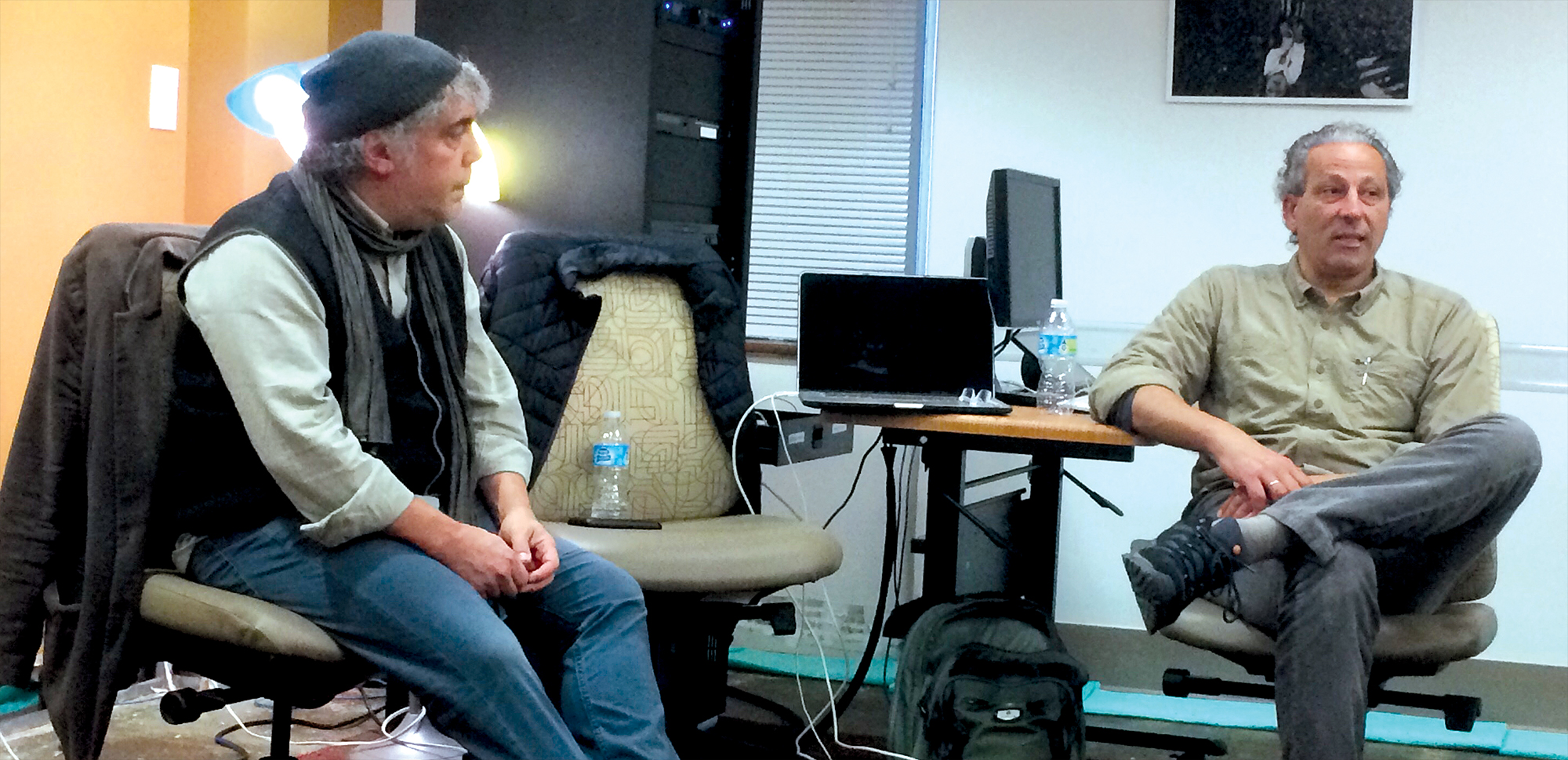In Gratitude: On Photography and Social Advocacy
May 18, 2020
The room was bubbling with emotion. Anger. Fear. Frustration. Anxiety. The images were often hard to look at, but we knew they were made with purpose. In this contribution to our Gratitude Journal, Lou Brown reflects on “Photography and Social Advocacy,” a program from 2016.
By Margaret "Lou" Brown

Ron Haviv (left) and Ed Kashi (right), Photography and Social Advocacy, December 8, 2016. Sponsored by the Forum for Scholars and Publics in partnership with the Southeastern Center for Contemporary Art (SECCA), with co-sponsorship by the Duke Human Rights Center at the Franklin Humanities Institute and the Center for Documentary Studies.
I've participated in hundreds of events at the Forum over the last seven years. Recently, I've been reflecting on the ones that cling, that pop up in my mind at unexpected times and still evoke intense feeling.
Among those is our event with photojournalists Ron Haviv and Ed Kashi in December 2016, when more than 50 curious visitors convened with us for an intimate discussion about photography and social advocacy. The program was so moving that I remarked in a subsequent email to our co-sponsors that an attendee was moved to tears (in a good way) by Kashi’s photographs, and that even at the two-hour mark, we still had a dozen people still in the room and eager to discuss.
What made the event extraordinary?
Now is a good moment to reflect on what made the gathering extraordinary. One feature of the event was the organic way it came together. Photographs by both Haviv and Kashi appeared in the Dispatches exhibit at the Southeastern Center for Contemporary Art (SECCA) curated by Cora Fisher, introduced to us by Wesley Hogan of Duke’s Center for Documentary Studies. Dispatches explored the relationship between art and current events through the works of 34 contemporary artists and photojournalists.
Over a series of conversations with SECCA's then-Curator of Education, Deborah Randolph, we landed on a set of common interests, and when SECCA made plans for a visit by some of the photojournalists in Dispatches, we enthusiastically accepted the offer to share their visitors with us.
Generosity.
In this noisy digital and social media era, we collectively wondered if there's still a place for the kind of photojournalism that forces moral reckoning.
The discussion itself continued in this generous spirit. For an hour, Haviv and Kashi shared images from their respective careers photographing violence, revolutions, natural disasters, and humanitarian crises. We saw elderly dancers in a nursing home, child laborers in an oil field, survivors from the Balkans wars, and victims and perpetrators of paramilitary violence in Panama.
They talked about what their work meant to them when they were younger, the responsibility they've always felt to their subjects and to their audiences, and their current fears in a world where it's become difficult to determine truth from fiction. The subsequent conversation with the audience went well beyond what it means to be a photographer in the twenty-first century and into what it means to bear witness, manage fear, and maintain hope in a violent and unjust world.
Trust.
Throughout the conversation, the room was bubbling with emotion. Anger. Fear. Frustration. Anxiety. The images Haviv and Kashi showed were often hard to look at, but we knew they were made with purpose.
It is impossible for photographers to control how their images are interpreted and used; photographs have helped change the course of history for the better and they have been used for ill. In this noisy digital and social media era, we collectively wondered if there's still a place for the kind of photojournalism that forces moral reckoning. We allowed ourselves to imagine how to shape a more just future. The raw, honest discussion that took place was possible because we trusted that the vulnerabilities on display in the room would not be exploited.
Care.
Kashi and Haviv approached the conversation with care and intentionality, arriving with a clear vision for the program. This could easily have been an ordinary slideshow, but it wasn't. The photographers weren't afraid to move things around in order to foster intimacy. They borrowed a floor lamp from one of our offices and reconfigured a desk as a café table, all to create the desired atmosphere.
This physical setting set the tone for them to engage in deep reflection with one another and to invite sincere dialogue with the audience. Their willingness to go where the audience led them in the final segment of the program is a testament to the sense of responsibility they shared about the consequences of their work.
Generosity. Trust. Care. And from me: Gratitude.

MARGARET (LOU) BROWN has worked for the last twenty years in interdisciplinary program development and community engagement. She holds a Ph.D. in sociocultural anthropology from Washington University in St. Louis, where she also taught and developed education and outreach programs in Anthropology, American Culture Studies, Social Thought and Analysis, and the Center for New Institutional Social Sciences. She is a Senior Research Scholar and the Director of Programs at the Forum for Scholars and Publics at Duke.
check us out
on social media